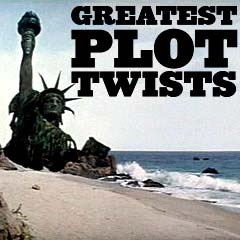
|
Film Spoilers and Surprise Endings E2 |
|
|
|||||||||||
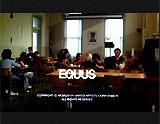
|
Equus (1977, UK/US)
This overlong, dialogue-rich film adaptation of Peter Shaffer's play, was directed by Sidney Lumet. [Note: Equus was the Latin word for horse.] Its tagline hinted at the film's plot:
It opened with a voice-over, asking: "What desire could this be?" as 17 year-old working class English stable boy Alan Strang (Peter Firth), naked, was seen nuzzling against a horse. The narrator was troubled, distraught, and soul-searching psychiatrist Martin Dysart (Richard Burton), who was treating the boy in an extreme case of brutality. Then began a flashback, to properly and in order tell the story - set in Hampshire, England. The repressed Dysart, an alcoholic who also had a failed marriage, was a doctor and administrator of an English psychiatric hospital for troubled teenagers. One of Dysart's patients in the division of Children and Adolescent Services, assigned through a court magistrate Hesther Saloman (Eileen Atkins), was teenaged, curly blonde-haired Alan Strang. In a rage, he had inexplicably and horrifically blinded six horses with a metal steel spike at his place of work on weekends: Harry Dalton's (Harry Andrews) stables. Slowly, the source of the boy's obsession with horses and outrageous behavior was determined by 45 minute daily sessions of therapy, self-tape recordings, hypnosis, acting-out, a placebo truth pill, Freudian couch discussions and the release of repressed emotions. His problems stemmed mostly from his over-protective parents, who had raised their son based on their rigid values:
Dora explained to Dysart that when Alan was a boy, a picture of a hideously-tortured Christ ("our Lord on his way to Calvary") on his bedroom wall was replaced by a picture of a white horse's head. He worshipped horses for their absolute humility toward humans: "They live for us, just for us, their whole lives," and he deified them as gods ("Behold, I give you Equus, my only begotten son"). Late at night to take the place of a horse, Alan would place a long string in his mouth, shaped like horse-reins, and flagellate his side with a coat hanger. He believed all horses were Equus, forever mouth-chained by iron reins ("chinkle-changle") - "for the sins of the world." He felt he could be saved by being borne away on horseback: "Two shall be one." The stable represented the horse's "holy of holies" where Alan cared for them, and the horses spoke to him, beckoning him to ride. Alan had been introduced to Mr. Dalton to work at the stable by Jill Mason (Jenny Agutter), a frequent rider and the daughter of a nearby antique shop owner. Although Alan claimed he never rode the horses that he meticulously groomed and cleaned beyond the call of duty, the distraught and upset stable manager Dalton suspected that Alan would sneak out at night and ride the horses. Under hypnosis, Alan revealed that he rode bareback in the nude until he was aroused ("stiff in the wind") and in an ecstasy, climaxed atop his beloved horse: ("I want to be inside you, and be you. Forever one person. I love you. Bear me away. Make us now one person"). Afterwards, he spent hours cuddling, kissing, and embracing the horse. Then Jill propositioned him late one afternoon for a date, and suggested that they see a Swedish skin flick titled "Swede and Low" in a local movie theatre. The auditorium was filled with men - Alan's father abruptly appeared and sternly dragged him outside, although Jill confessed it was entirely her idea. And then his father explained he was solely there for business with the theater's manager - although Alan knew it was a lie.
In the last twenty minutes of the film, Alan described how he was offered his first emotionally-exposed human sexual experience with Jill above the horses after they walked back to the stable. After they both undressed standing at opposite ends of the stable loft, they complimented each other on their mutual nakedness: Alan: "You're beautiful." Jill: "So are you." The two came together, kissed, and began to have sex, but Alan proved to be impotent when he tried to "put it in her all the way." He rolled off of her, turned away, and felt ashamed. He explained:
Although she was reassuring: "It's all right. I don't mind. Really I don't..There's nothing wrong...Please believe me, there's nothing at all wrong," Alan couldn't accept her words and ordered her out, disregarding her offer to sit down and talk. She protested that she was his friend and that it didn't matter, but he refused to listen. He believed that the spirit of Equus was watching him with the female, and caused him to not be able to perform. Alan's outrage at his personal deity was triggered by his sexual inadequacy with Jill, and he took his frustrated guilt and anger out on the horses. His twisted religiousity and pathological-sexual fascination and fixation with horses led to his crime. That same night, he pleaded forgiveness from Equus ("Equus the merciful, forgive me. It wasn't me, not really me. Take me back. I'll never do it again, I swear, please!") and then committed the bloody and disturbing crime due to temporary insanity -- he blinded the six horses with a curved metal scythe out of desperation and shame, to prevent them from seeing him ("God sees. My god hast seen! No. No more Equus! Thou, God seest nothing"). As Mr. Dalton arrived in the midst of the commotion, Alan screamed out: "Find me and kill me," and Dalton struck him on the head. After the mutilation incident, Jill had a "complete and utter breakdown." Dysart realized that if he cured the sick, pained and insane boy, he would remove the boy's passion and ecstasy - the cure would be worse than the problem. To the magistrate, Dysart exclaimed:
He later summarized as the film ended:
It was also revealed that Dysart had major issues of his own: a loveless, incompatible and childless marriage with a Scottish dentist named Margaret that had briskly fallen apart. He compensated with the study of mythological Greek culture, a collection of books and reproduced relics, and a yearly trip to the Mediterranean. |
 Naked 17 Year-Old Alan With Horse 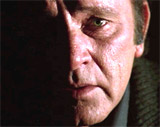 Psychiatrist Martin Dysart (Richard Burton) 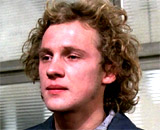 Alan Strang (Peter Firth) 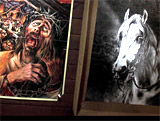 Pictures: Crucified Christ And White Horse's Head 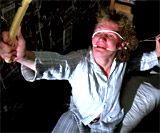 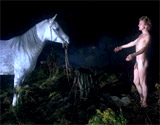 Alan Identifying with Equus 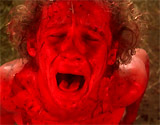 Alan After Blinding the Horses |
|||||||||
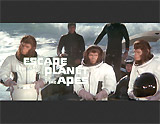
|
Escape From the Planet of the Apes (1971)
One of the taglines to this second sequel to the original 1968 film, following after Beneath the Planet of the Apes (1970), was: "Meet baby Milo who has Washington terrified." A baby ape named Milo was the progeny of two intelligent, talking chimpanzees, who had used Astronaut Taylor's (Charlton Heston) spaceship to time travel to 20th century Los Angeles:
At first, they were hailed as celebrities, but soon became targeted as "dangerous" to society. Their ape baby Milo, born in the year 1973 in Los Angeles, was also endangered. In the twist ending, it was revealed that Milo had been switched with the baby (Salome) of a non-speaking circus ape named Heloise, for protection's sake. Paranoid and sinister Senior Science Advisor to the US President, Dr. Otto Hasslein (Eric Braeden) was determined to kill the talking apes' baby to prevent the eventual domination of the Earth by the creatures and the destruction of the Earth 2,000 years into the future. Zira and Cornelius were befriended by two sympathetic doctors and circus manager Señor Armando (Ricardo Montalbán) who was in on the plan and promised to care for the infant ape and protect it from harm. In the final scene, Cornelius and Zira (and the baby Salome that she was carrying bundled in a blanket) were pursued while hiding on a derelict tanker at an abandoned harbor area. Cornelius was the first to be gunned down. With her last effort, lethally-wounded Zira threw her dead baby overboard, and then stumbled to Cornelius' side to die lying on top of him on the deck. Afterwards, Armando spoke to an infant ape in a cage, as the circus was moving to its winter quarters in Florida:
Baby ape Milo (with a protective St. Francis of Assisi medal around its neck) had been saved by Armando. The baby ape struggled to speak the words: "Mama, Mama, Mama, Mama" with the voice of a human child as the film ended. |
 Death of Cornelius 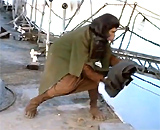 Zira Throwing Her Ape Baby Overboard 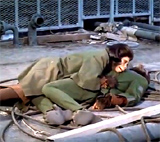 Zira Dying Atop Husband Cornelius 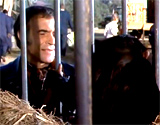 "Intelligent creature..." 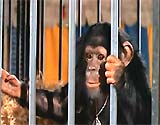 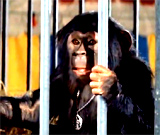 "Mama, Mama..." |
|||||||||
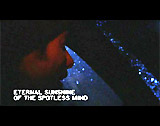
|
Eternal Sunshine of the Spotless Mind (2004)
Music video director Michel Gondry's second feature film was a whimsical and innovative romance-comedy from inventive scripter Charlie Kaufman. It was a bizarre, artful and absurdist romantic fantasy, with a jigsaw puzzle twist, about the lobotomizing erasure of painful memories in a 2-year relationship between two ex-lovers. Alexander Pope's 1717 poem Eloisa to Abelard provided the film's title (referencing a line about forgetting painful memories), spoken by Kirsten Dunst as one of the characters, but attributed wrongly to "Pope Alexander." It opened with an optimistic prologue (afterwards revealed as much later in the timeline), introducing lonely, introverted, "close-mouthed" Joel Barish (Jim Carrey) waking up and skipping a day of work as he muttered (in voice-over): "Random thoughts for Valentine's Day, 2004. Today is a holiday invented by greeting card companies to make people feel like crap." Ditching work after noticing his damaged car's left door, he impulsively took a train to Montauk Point State Park to its off-season, frigid beach, when he saw quirky, free-spirited multi-color-haired, tangerine-colored sweatshirt-wearing Clementine Kruczynski (Kate Winslet) on the train. He noticed that pages from his journal were inexplicably ripped out and missing ("Don't remember doing that"), and he made his first entry in two years. The female was also in a diner, when he thought to himself: "Why do I fall in love with every woman I see who shows me the least bit of attention?" On the return trip on a Long Island train, she asked him: "Do I know you?," and they were inexplicably attracted to speak to each other, although she was feisty with him at times and they were incompatible or unlikely as a couple. She confided that she was glad he was treating her nicely, but also apologized that she appeared dippy and "nutso." And then over drinks in her apartment (decorated with potato heads), she confessed: "I'm gonna marry you. I know it." They also spent a playful night on frozen-over Charles River looking at the stars, and he drove her to her apartment the next morning. [Note: Later, as the scene played longer, Joel exclaimed: "I had the best f--king night of my entire f--king life."] After a fade-out, the film began a second time. The credits appeared over the next scene, to the tune of "Everybody's Got to Learn Sometime." Joel had just had a bitter break-up with his loving girlfriend - uninhibited Clementine. He was attempting to win her back by buying her a necklace pendant (made from a hand-painted shell) from her favorite store as an early Valentine's Day gift. When he went to present it to her at her place of employment, Barnes and Noble bookstore, he mournfully realized that she didn't know him ("She looks at me like she doesn't even know who I am...Why would she do that to me?"). He learned that she had all traces of him and their relationship deleted from her memory (to create a "spotless mind" and "move on"), by a New York City company known as Lacuna, Inc. In an act of despair, Joel decided to undergo the same procedure to find peace of mind through the services of the inventor of the erasure process, mad-scientist Dr. Howard Mierzwiak (Tom Wilkinson) ("Technically speaking, the procedure is brain damage, but it's on a par with a night of heavy drinking"). Mierzwiak instructed Joel to collect all mementos of Clementine (in two garbage bags) from his two years with her, so that they could be destroyed, but first, the objects would be used to map Joel's brain and target memory areas for selective erasure. Joel anticipated the result: "The perfect ending to this piece-of-s--t story." The story was then told with reverse-order flashbacks, beginning with the most painful memories of the doomed couple's recent breakup, progressing forward to their earliest, best memories. While unconscious and drugged (with a helmet on his head) in his own apartment that night as he lay prone on his sofa-bed, the firm's inept and bumbling technicians conducted the erasures:
Stan and Mary became drunk and stoned as they danced together in their underwear on and around the sofa-bed (and had sex) during the process, while Patrick left to comfort his upset new girlfriend Clem! (Unethically, Patrick had abusively stolen some of Joel's memories, and ultimately his identity, to seduce and 'win' Clem's heart, e.g., her pet name (tangerine), saved love notes, Joel's jewelry gift, etc..) Joel had a flood of memories of their time together as he moved through their relationship history, beginning with his most recent memories of 2004 which were selectively erased first, and moving backward into 2003:
He reviewed and traveled (in reverse) through his experience of passionately loving her through to his first meeting of her, and the wonderful, painful yet imaginative recollections and memories that the romantic experience generated. They were deeply recessed within an "emotional core" in his brain (including those of his childhood):
Along the way, Joel came to the realization that he didn't really want to forget Clementine after all and he struggled and fought to stay connected with her and keep his memories of her (and backgrounds) from being deleted. He screamed for the device to be turned off, shouting: "Is anybody there?" and "Wake me up!", but his yearnings were only in his own unconscious sleeping mind. To foil erasure efforts, he hid inside some of his childhood scenarios when four years old. He crouched in his childhood kitchen (with giant furniture), while Clementine was visualized as his red-haired childhood baby-sitter (with mini-skirt and white go-go-boots), and they bathed together in a sink. To hide even deeper and buried, he fled to a masturbatory fantasy aided by an X-rated comic book, to a beach where the couple were in bed together, and to a shameful childhood memory when young bullies forced him to pound a bird with a hammer. During the procedure, Mary impulsively kissed Dr. Mierzwiak, who had been called to Joel's apartment during the botched process. She admitted to the married doctor that she had a crush on him: "I've loved you for a very long time." Although the doctor's disgusted wife Hollis (Deirdre O'Connell) knew of their affair ("Oh you poor kid. You can have him, you did"), Mary was ignorant and didn't realize that Howard had erased her memory in October of 2002 to cover it up (Mierzwiak: "We have a history. I'm sorry, you wanted the procedure"). The last of Joel's memories was his first meeting with Clementine at the beach, when she ate a piece of chicken from his plate and he thought to himself: "You just took it. It was so intimate like we were already lovers." That evening, they broke into a Montauk beach house (Clem: "It's our house, just for tonight"), where the structure disintegrated around them as all his memories disappeared. Joel regretfully admitted: "I wish I'd stayed, I do," and his last memory (as their images blurred) was Clementine whispering: "Meet me in Montauk." The film looped back to the prologue, as Joel awoke and found his car damaged. Meanwhile, Mary was quitting her job and absconding with the office files of the clients. Clementine received her file in the mail the next morning after she had spent the night at the Charles River with Joel. She listened to her own audio recording session before the erasure - while in the car with Joel - of how she had decided to have her memory erased because of him: "I don't like myself when I'm with him...I can't stand to even look at him." Both were bewildered and pained by the revelation. Shortly later, she went to Joel's apartment, where she found him listening to his own pre-erasure confessions. Although confused, they both vowed to try again with their relationship:
|
 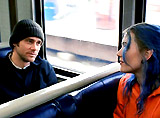 Flashback Prologue: Joel (Jim Carrey) and Clementine (Kate Winslet) Meeting on Train 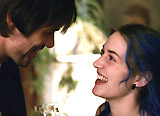 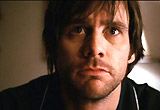 Their Nasty Breakup 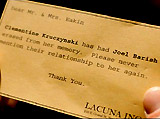 Lacuna's Removal of Clementine's Memories of Joel 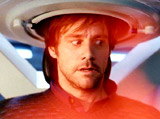 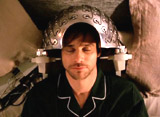 Attempted Erasure of Joel's Memories of Clementine 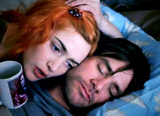 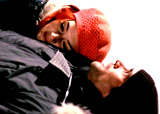 Flood of Joel's Imaginative Memories 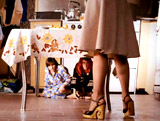 Hiding in Kitchen 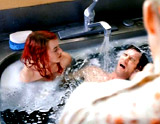 Bathing Together in Sink 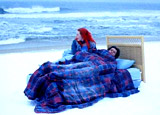 In Bed On Beach 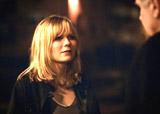 The Reveal of Mary's (Kirsten Dunst) Wronged Relationship With Dr. Mierzwiak (Tom Wilkinson) 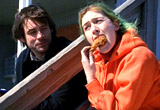 The Last of Joel's Memories - Clementine Eating Piece of Chicken  Joel: "I wish I'd stayed, I do" 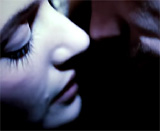 Clementine (whispered): "Meet me in Montauk" 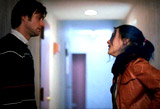 Clementine at Joel's Apartment - Vowing to Try Again |
|||||||||
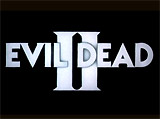
|
Evil Dead II (1987) (aka Evil Dead 2: Dead by Dawn)
In its opening, this gruesomely funny horror film 'remake' or sequel retold (or recapped) what occurred in the first film, The Evil Dead (1981). The setting was a secluded cabin in the woods. And then after a series of adventures in the cabin for Ash Williams (Bruce Campbell), in the conclusion, Annie Knowby (Sarah Berry) delivered an incantation ("You did it kid") to rid the earth of the evil deadite demons. However, she was stabbed in the back by Ash's severed hand. Surviving Ash was sucked and propelled into a whirling portal, along with his '88 Oldsmobile, into a time-travel journey to the Middle-Ages, ca 1300s. There, he was surrounded by knights in armor (Crusaders) on horseback, who believed that he was a fearsome deadite. However, when everyone was threatened by a real flying deadite, Ash removed his shotgun from a holster with his left hand, and blasted the creature's head to smithereens.
He was worshipped as a liberating hero by all of the knights:
Horrified, Ash repeatedly screamed: "Nooo!" as the camera pulled back, and the screen turned to black for the closing credits. |
 Time Travel Portal 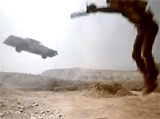 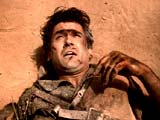 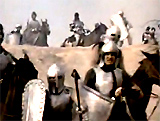 Awakening in the Middle Ages 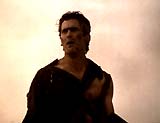 "Nooo!" |
|||||||||
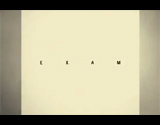
|
Exam (2009, UK)
Director Stuart Hazeldine's low-budget, intriguing sci-fi psychological thriller (his directorial debut film) began with a simple formulaic premise, similar to Cube (1997), Identity (2003), Saw (2004), Fermat's Room (2007), and The Killing Room (2009). In a pseudo-futuristic time frame during "dark times," eight individuals (representing various cross-sectional stereotypes of cultures and ethnicities) were led into a claustrophobic, stark, windowless elongated room for a company's recruitment assessment exam or test. Each of the individual desks had a pencil and blank but numbered 1-8 question sheet - one for each of the eight candidates. A stern invigilator (Colin Salmon) from the company described that they were the final group of candidates for the demanding job. The test's ground rules for the 80-minute test, consisting of only one question ("There is one question before you, and one answer is required"), and the reasons for disqualification (and removal) were announced:
Then, the invigilator asked a sole question - the key to the entire film: "Any questions?" There were no replies. Soon after, White gave each person a color-nickname based upon their looks or behavior (listed here in the order of disqualification):
The strangers in close quarters eventually realized they had to work together and cooperate in "the ultimate mind-f--k." Brown theorized: "Who'll decipher the question? Who'll come up empty and fold? And who'll crack under the pressure?" As the time counted down on a red digital clock readout, the following revelations were made:
|
 White 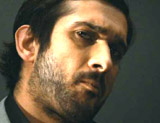 Brown 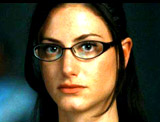 Dark 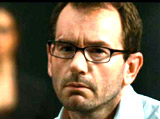 Deaf 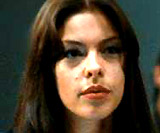 Brunette 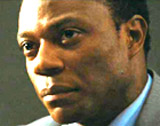 Black 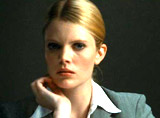 Blonde |
|||||||||

|
eXistenZ (1999)
During the spate of multiple-reality films with the theme 'what's authentic and what's not real?', this David Cronenberg film was another entry. The famed director's science-fiction film was tinged with body horror - typical of most of his films. The tagline boasted:
Background Information:
The film opened with game company Antenna Research's project manager and seminar leader (Christopher Eccleston) in front of about 75 participants at an invitation-only seminar, advertised as a product test launch. The setting was an old country church with stained glass windows. He called to the stage brilliant inventor-designer and creator Allegra Geller (Jennifer Jason Leigh) ("The Game Pod Goddess Herself") - billed as "the world's greatest game designer." She presented a short introduction to eXistenZ, her newest creation - an entirely new virtual-reality game system and her latest bio-engineered video game, developed for Antenna. Twelve volunteers or participants were called up to the stage to take part in the product test. Levi described how the new toys were made of MetaFlesh with a very non-standard connecting device known as an UmbyCord. The game was played and interfaced by plugging a living, undulating, flesh-colored game control unit (or pod with nipples) directly into one's central nervous system. The player inserted a fleshy, umbilical cord-like tube into a 'bio-port,' a small anus-like orifice in the small of one's back. When engaged, the game took the player into a virtual world of the future. The legendary game-player Geller warned the players: "It's going to be a wild ride." When the game was being debuted, there was an assassination attempt on Geller's life from the audience by fanatical Realist terrorist Noel Dichter (Kris Lemche). Dichter was armed with a pistol or "gristle gun" made of a chicken's bony carcass that shot human teeth bullets. [Note: The flesh and bone gun was designed to get through any kind of metal or synthetics detector.] He cried out: "Death to the demoness Allegra Geller! Death to Antenna Research!" Geller was shot in the right shoulder and fell to the floor from her chair. Dichter also fired and shot the seminar leader directly in the chest. Two security assistants pulled out normal guns from hidden holsters and emptied their clips into the prostrate Dichter. The main Antenna Research security guard Ted Pikul (Jude Law), actually a novice PR marketer, grabbed the gristle gun, and then unplugged or unported Geller - who was in agony on the floor. She grabbed her game pod and UmbyCord as she was led out of the crowded room by Pikul. They drove off, fearing a conspiracy that was hunting them and marking them for death. At a motel while hiding out, she learned that he had not been surgically fitted with a bio-port (he had never played any games), and she seductively urged him: "Once you're ported, there's no end to the games you can play." She was worried that her game pod (containing the only original copy of the eXistenZ game, that cost $38 million to develop over a five-year period) was damaged when pulled out during the on-stage demonstration, and suggested that the two had to replay the game to determine the extent of the damage:
After Pikul reluctantly agreed to the surgical penetration required, they drove to a country gas station managed by "liberated" black marketeer Gas (Willem Dafoe) to have an "illegal and unregistered" bioport installed. After Gas deliberately installed a faulty port into Pikul's lower back, Geller's game pod was damaged when she plugged the pod (via its two-player Y-shaped UmbyCords) into his new spinal bioport - and it "neuro-surged." Flashes and crackles indicated that the pod blew up. She angrily felt "locked out" of her own game. When double-crossing Gas revealed that he wanted the $5 million bounty offered for Geller's capture, Pikul killed Gas with a shot from the bioport insertion rivet-gun into his neck. They fled together to a former ski club lodge - a wooden A-frame structure in the woods. It was run by Geller's mentor Kiri Vinokur (Ian Holm). The pod was repaired in the chalet's workshop and a bioport was properly installed in Pikul's back. [However, later it was learned that the bioport was deliberately infected in order to sabotage game play.] After Geller plugged her repaired pod into Pikul's back to play eXistenZ, the chalet melted away and they were in the interior of a video game emporium, a shop that Geller often visited as a kid. Pikul asked about the rules of the game they had just started to play, to which Geller replied:
The 50-ish, graying video game shop owner D'Arcy Nader (Robert A. Silverman) provided them with new micro-pods, miniature versions manufactured by Antenna Research's competing company, Cortical Systematics (with "the latest and the hottest. Not just a new game but a new system"). The new smaller micro-pods completely plugged into their industry-standard, lubricated bio-ports ("the whole pod just disappeared into your back") in a highly-sexualized maneuver. They began passionately making out with each other as they downloaded their new identities. Pikul and Geller were now two assembly line co-workers at a game-pod factory. The factory was an ex-Trout Farm owned by Cortical Systematics:
Pikul was wrapping up mutilated bodies of various water creatures (frogs, fish, etc.) in plain brown wax paper. He was next to long-haired co-worker Yevgeny Nourish (Don McKellar). On his way to a lunch break at a filthy Chinese Restaurant (another game module) in the woods, Pikul met up with Geller in a pod assembly bay/stall. At the restaurant, Pikul expressed that in the game, he was feeling "disconnected" from his real life. He feared "losing touch" with himself with an "element of psychosis." He paused the game of eXistenZ - and the two were transported back to their room in the ski chalet, where Geller thought it was now only "safe" and "boring." Pikul described more fears - a hint to the film's final twist:
Revelations occurred as the game was further played - with lots of double-crosses, false allegiances, and attempts on Geller's life.
Pikul expressed his anxiety about VR games and game-playing - revealing his secret allegiance to the Realists, after the two returned to the game-pod factory:
After killing both Nourish and Pikul, Geller held her hands up in the air and delightedly asked: "Have I won the game? Have I won?" Suddenly, Geller and Pikul appeared on stage, as two of twelve game-players (similar to the opening sequence) seated in a semi-circle, after a 20-minute game experience using blue electronic game pods and plastic head pieces. It was definitely a different game than eXistenZ because the players were using electronic devices rather than game pods. All of the characters in the film had been participants in the test or sample audience who were playing and testing a new VR game (transCendenZ). A short debriefing of the experience occurred, with testers making comments. The entire film just seen was a game within a virtual reality computer game known as transCendenZ from Pilgrimage games. Game-tester Geller had just won the game of eXistenZ by 'killing' fellow game-tester Pikul within another game known as transCendenZ. After the discussion, the game's developer Nourish expressed how he was personally disturbed and nervous by the game just played because of the way it started: "It had a very strong, very real anti-game theme. I mean, it began with the attempted assassination of the game designer." The film's climactic ending contained another unexpected and clever twist. This new game concluded when Geller and Pikul -- who were actually assassins back in reality, killed Nourish ("the world's greatest game artist") who they feared was a threat to actual reality ("Don't you think you should have to suffer for all the harm you've done, and intend to do, to the human race?"). Geller screamed out: "Death to the demon Yevgeny Nourish!" Pikul added: "Death to PilgrImage! Death to transCendenZ!" The film's last line, spoken by one of the game-testers, the waiter in the Chinese restaurant, revealed the film's central twist - it was possible that they were characters in yet another computer game simulation:
|
 Allegra Geller (Jennifer Jason Leigh) 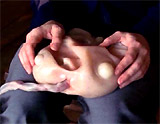 The VR Game Pod Control Unit 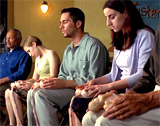 Game Testing Participants 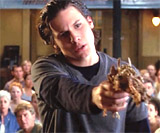 Assassination Attempt on Geller's Life By Dichter With Gristle Gun 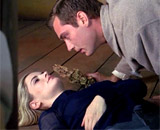 Geller Shot on Floor, With Ted Pikul (Jude Law) 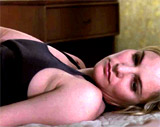 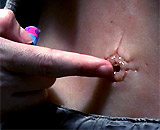 Bio-Port - Damaged? 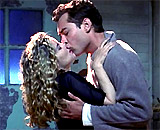 Making Out: Geller and Pikul 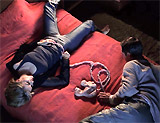 Pikul With Geller 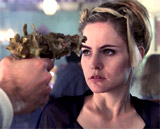 Pikul With Gristle Gun 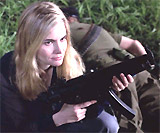 Geller With Machine Gun, Killing Vinokur 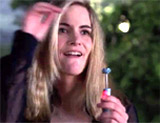 Geller Detonating Pikul's Bio-Port to Kill Him 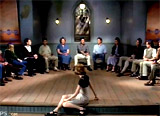 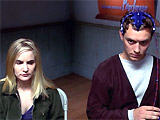 Back on Stage as Game Players 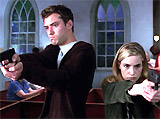 Geller and Pikul as Assassins 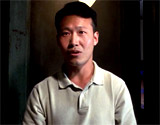 Chinese Waiter/Game Player: "Are We Still in the Game?" 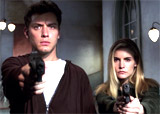
|
|||||||||
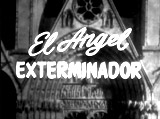
|
The Exterminating Angel (1962, Mex.) (aka El Angel Exterminador)
This surrealistic, daring and macabre Luis Bunuel fantasy-comedy was about the degeneration of human nature. After attending a religious operatic play about a naive virgin ("Virgin Bride of Lammermoor"), twenty members of the privileged class were bourgeois dinner guests at the Mexico City estate on the street of "Calle de la Providencia." The dinner was hosted by aristocrat Senor Edmundo Nobilé (Enrique Rambal) and his wife Lucia. After the meal no longer attended by proletariat workers (the cook and other servants had left), the guests retired to the music room, and appeared to settle in for the night. By the next morning, the guests were still there and hesitated to leave. They were trapped or held in for days by an inexplicable and baffling force, a psychological barrier, sheep-like behavior, or by rueful acceptance or suggestion. Degenerating into animal-like behavior (with quarreling, hysteria, and aggression), they became ravenously hungry. They slaughtered sheep for food, broke through the brick walls to access drinking water in the pipes, and burned the furniture. The bodies of two lovers (Beatriz and Eduardo) who had suicidally killed themselves were hidden in a closet. Eventually the desperate party guests barbarically turned against their aristocrat host for feeling self-entrapped and insulated. When they finally left the house in the film's twist ending, they entered a cathedral to attend a funeral mass. Again, they became confined as parishioners inside a Catholic church (the clergy were trapped also) after the morning service. There was a riot in the streets, and the military was summoned to gun down the rioters. In the last image, a herd of sheep wandered toward the church and entered in single file, as the church bell tolled. |
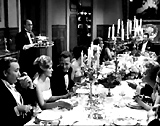 The Elegant Hosted Dinner 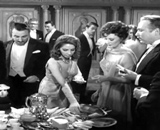  The Dinner Guests: Before and After 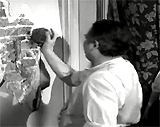 Breaking Through the Wall  Military Firing on Rioters 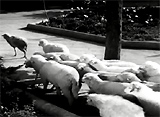 Sheep Entering Church |
|||||||||